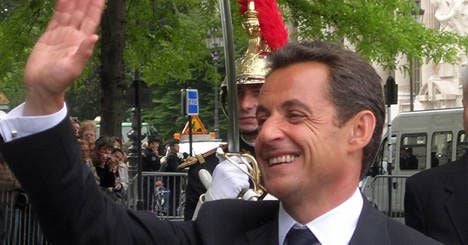Incumbent Sarkozy began the day apologising for the perceived mistakes of his time in office since 2007, while polls said main rival Socialist Hollande was increasingly tipped for victory on Sunday and in a May 6 run-off.
Both candidates were to stage final rallies on Friday at opposite ends of the country, Sarkozy in southern city Nice and Hollande in the impoverished northern Ardennes region, both traditional right-wing bastions.
“I’ve come to this region that placed its trust in Nicolas Sarkozy” when he visited during the last election in 2007, Hollande said ahead of his final rally in Charleville-Mezieres.
“(Sarkozy) even came to the Ardennes to make a speech about workers, jobs, industry. Everyone can see how great the disappointment is,” Hollande lamented.
Sarkozy has struggled to play up the reforms of his presidency, hit hard by the global economic downturn, and has been dogged by criticism that his flashy and overbearing style lowered the standing of France’s head of state.
“Perhaps the mistake I made at the start of my mandate is not understanding the symbolic dimension of the president’s role and not being solemn enough in my acts,” a contrite Sarkozy told RTL radio.
“A mistake for which I would like to apologise or explain myself and which I will not make again,” he said, insisting: “Now, I know the job.”
The vote is seen by many as a referendum on the unpopular Sarkozy, who feted tycoons and married supermodel Carla Bruni during his five-year term, rather than a chance to choose France’s first Socialist president since 1995.
The latest survey before campaigning and opinion polls were to be banned at midnight on Friday said Hollande would win 29 percent of votes to Sarkozy’s 25.5 percent before the pair meet head-on in the second round.
Hollande is on course to win the final vote with 56 percent to the right-winger’s 44 percent, polling organisation IPSOS forecast.
Far-right candidate Marine Le Pen could take 16 percent in the first round, the far-left’s Jean-Luc Melenchon 14 percent and centrist Francois Bayrou 10 percent, IPSOS said.
However, a poll from TNS Sofres said the two men would each score 27 percent of votes on Sunday.
“In any case, Nicolas Sarkozy doesn’t believe in opinion polls,” said his spokeswoman Nathalie Kosciusko-Morizet. “He feels that they do not reflect the reality of this campaign.”
Guillaume Peltier, another Sarkozy spokesman, said 12 million voters were still undecided: “Given the large number of undecided voters and the volatility of vote intentions, the only thing that’s certain is uncertainty.”
But pro-Sarkozy newspaper Le Figaro admitted that “confidence has swept into Francois Hollande’s camp” where “the candidate is having difficulty concealing his optimism”, to the point of denigrating potential second-round allies.
Amid speculation that he could reach out to Melenchon or Bayrou to ensure his victory in the run-off, Hollande has said there would be no between-round deals, such as tapping a prime minister from among his rivals.
“There is no place in a presidential election for negotiations between parties. No bartering, no concessions, no exchanges,” Hollande said.
Hollande’s campaign chief Pierre Moscovici said that voters had a “powerful and tranquil expectation of change” and those backing other left-wing candidates in the first round would end up voting Hollande.
“Hollande will become the candidate of the Socialist Party and of its allies: he will be the candidate of the left and of change,” Moscovici told Le Parisien newspaper.
Sarkozy was briefly buoyed by security fears in the wake of last month’s Al-Qaeda-inspired killings in Toulouse and has vowed to cut immigration, but the economy has been the overwhelming issue throughout the campaign.
With almost 10 percent unemployment, the eurozone debt crisis has shaken the economy and French citizens’ purchasing power is diminishing.




 Please whitelist us to continue reading.
Please whitelist us to continue reading.
Member comments